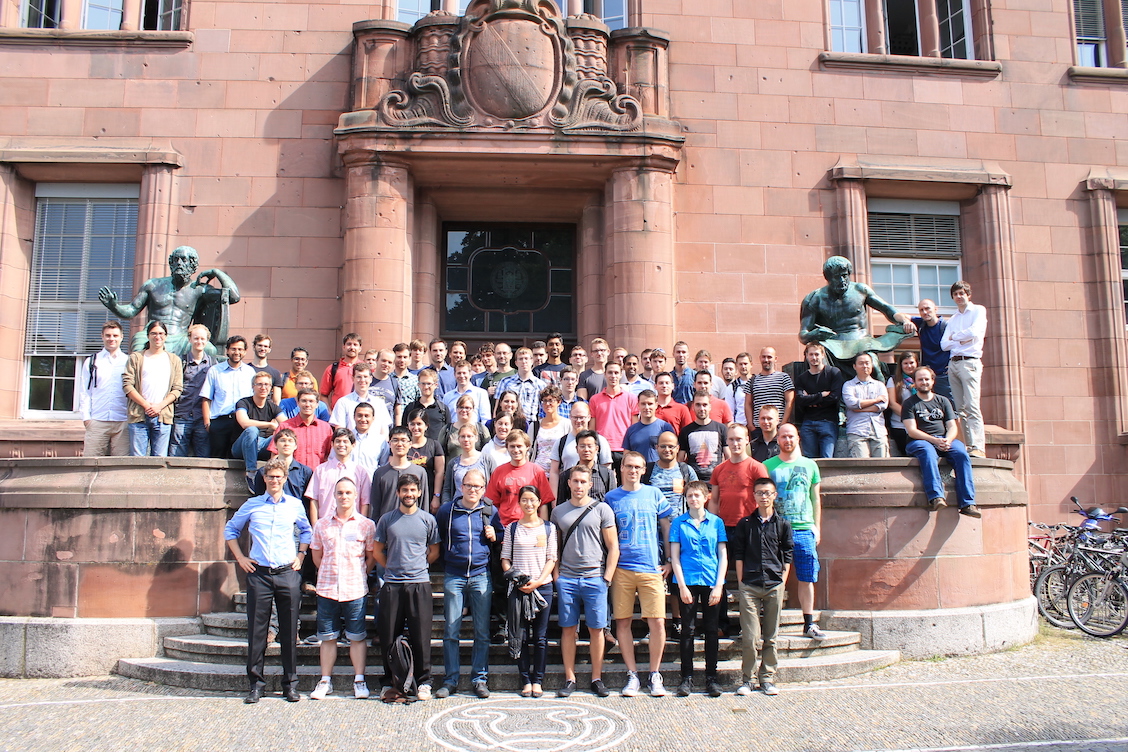Summer School on Numerical Optimal Control
Monday, August 04, 2014, 9:00 - Wednesday, August 13, 2014, 18:00
KG I, Aula, Platz der Universität 3, FreiburgKollegiengebäude I, Aula, Platz der Universität 3 , D-79098 Freiburg, Germany

The aim of this intensive 8 day course is to give both theoretical background and hands-on practical knowledge in the solution of optimal control problems with underlying differential equation models, as they arise for example in robotics, chemical engineering, biology, mechatronics or aerospace. Participants will learn how to formulate and to numerically solve complex optimal control problems with the help of state-ofthe- art computing tools. Content: The course covers all topics relevant for the formulation and practical solution of optimal control problems (OCP) with nonlinear differential equation models. It starts by recalling concepts from numerical simulation of ordinary differential equation models (ODE) and differential algebraic equations (DAE) as well as concepts from nonlinear optimization with equalities and inequalities, and the computation of derivatives. It then treats the three big families of optimal control solution approaches: the Hamilton Jacobi Bellman (HJB) equation, the indirect approaches based on Pontryagin’s minimum principle, and direct approaches. The major focus of the course is on the latter, in particular on direct collocation, direct single and direct multiple shooting. A second focus is on important application classes such as parameter and state estimation and nonlinear model predictive control (NMPC). The course also treats several implementation and modelling details such as the treatment of higher index DAE and invariants, choice of discretization schemes and quadratic programming (QP) solvers. All lecture topics are accompanied by intensive computer exercises, for which we use the free and open-source optimisation environment CasADi https://github.com/casadi/casadi/wiki. In the last three days of the course, the participants will work, during the exercise sessions, on self chosen optimal control problems, whose results will be publicly presented to all course participants on the last day.
Prerequisites, Workload and Evaluation: The course is self contained and can be followed by all quantitative scientists with basic mathematical background (calculus and linear algebra). It is recommended for both industrial and academic practitioners of control and optimization as well as for master and PhD students of engineering, computer science, mathematics, and physics. The total workload is 90 hours including lectures, project work and self-study, and the course gives 3 ECTS credits. The final course evaluation is based 50% on the written exam and 50% on the projects. A certificate of attendance can be given to participants not wishing to participate in the exam and/or project.
Location and Schedule: The course takes place from Monday, August 4, 2014 to Wednesday August 13, 2014, from 9:00-18:00, in the main historical university building in the city center of Freiburg (Kollegiengebäude I, Aula, Platz der Universität 3 , D-79098 Freiburg). Lectures and computer exercises take place on August 4-8. In the weekend (August 9), an optional excursion into the black forest is foreseen. The written exam takes place on Monday, August 11, 9:00-10:30, and from then on participants work under close supervision on self-chosen application projects. The final project presentations take place on Wednesday, August 13.
Registration: Participation in the course is free of charge, while food and coffee and the optional excursion will require a minor cost contribution. To register or obtain additional information, please write an email to Christine.Paasch@imtek.uni-freiburg.de with subject “NOC2014 Course Registration” before July 1st, 2014.
Teachers and Organizers: Prof. Dr. Moritz Diehl, Dr. Joel Andersson, Joris Gillis, Rien Quirynen, Greg Horn, Mario Zanon, Christine Paasch, Savannah Cook. University of Freiburg and University of Leuven. Support by the EU via the ITNs TEMPO (607957) and SADCO (264735), and the ERC Project HIGHWIND (259166) is gratefully acknowledged.
Course material
- General information:Course Flyer, Welcome Info, Schedule
- Lecture 1: Course Introduction, Optimization Overview, Linear Programming
- Exercise 1: Python Tutorial, Exercise sheet, qpsolve.py, Solution
- Lecture 2: Unconstrained optimization, Constrained Optimization, SQP and IP
- Exercise 2: CasADi Intro, Exercise sheet, Solution
- Lecture 3: Dynamic Process Models, Simulation Methods
- Exercise 3: Exercise sheet, Solution
- Lecture 4: Algorithmic Differentiation, Solution of BVPs
- Exercise 4: Exercise sheet, Solution
- Lecture 5: Dynamic Programming, Optimal Control Overview
- Exercise 5: Exercise sheet, Solution Template, Solution
- Lecture/Exercise 6: Pontryagin’s maximum principle, Exercise 6
- Lecture 7: Direct Methods, Direct Shooting Methods
- Exercise 7: Excercise sheet, direct multiple shooting solution, direct single shooting solution, gauss newton solution
- Lecture 8: Direct Collocation
- Exercise 8: Exercise 8, quadcopter model, timeopt solution, tracking solution, template timeopt, template tracking
- Lecture 9: Nonlinear MPC, ACADO Code Generation, VanDerPol.m visualize.m, Airbone Wind Energy
- Exercise 9: Exercise sheet, NMPC with Gauss-Newton Solution, NMPC with Gauss-Newton Template, NMPC with IPOPT plotter
Recomended books and other links
- M. Diehl: Script on “Numerical Optimal Control”
- J. Andersson: A General-Purpose Software Framework for Dynamic Optimization. PhD thesis, KU Leuven.
- Bryson, A., and Ho, Y. Applied optimal control: optimization, estimation, and control. Blaisdell, Waltham, MA, 1969.
- Biegler, L. T. Nonlinear Programming. MOS-SIAM Series on Optimization. SIAM, 2010.
- Betts, J. Practical Methods for Optimal Control and Estimation Using Nonlinear Programming, 2nd ed. SIAM, 2010.
